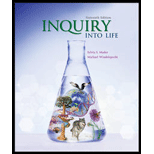
To analyze:
The chemical structure of a steroid.
Introduction:
Steroids are organic compounds having 4 rings of carbon atoms with 3 hexagonal shaped rings and one pentagonal shaped ring. But there are different
Explanation of Solution
Cholesterol - C27H46O
It is a steroid that has four linked hydrocarbon rings and hydrocarbon tail attached to one end of the steroid with the other end linked with the hydroxyl group. It is to form a hydrogen bond with the other carbonyl group.
Testosterone − C19H28O2
It is a steroid made of four rings out of which 3 are hexagonal rings and one is a pentagonal ring. The rings are joined with each other having a common side and are in the shape of “S”. It has one alcohol group.
Estrogen - C18H24O2
It is a steroid made of four rings of which 3 are hexagonal and one is a pentagonal ring. It has alcohol at C3 and C17 positions with the methyl group at C13.
All the steroid molecules have 3 hexagonal rings and one pentagonal ring. The linkages are attached, and this alters the functions of each steroid.
Want to see more full solutions like this?
Chapter 20 Solutions
Inquiry Into Life (16th Edition)
- ✓ Details Draw a protein that is embedded in a membrane (a transmembrane protein), label the lipid bilayer and the protein. Identify the areas of the lipid bilayer that are hydrophobic and hydrophilic. Draw a membrane with two transporters: a proton pump transporter that uses ATP to generate a proton gradient, and a second transporter that moves glucose by secondary active transport (cartoon-like is ok). It will be important to show protons moving in the correct direction, and that the transporter that is powered by secondary active transport is logically related to the proton pump.arrow_forwarddrawing chemical structure of ATP. please draw in and label whats asked. Thank you.arrow_forwardOutline the negative feedback loop that allows us to maintain a healthy water concentration in our blood. You may use diagram if you wisharrow_forward
- Give examples of fat soluble and non-fat soluble hormonesarrow_forwardJust click view full document and register so you can see the whole document. how do i access this. following from the previous question; https://www.bartleby.com/questions-and-answers/hi-hi-with-this-unit-assessment-psy4406-tp4-report-assessment-material-case-stydu-ms-alecia-moore.-o/5e09906a-5101-4297-a8f7-49449b0bb5a7. on Google this image comes up and i have signed/ payed for the service and unable to access the full document. are you able to copy and past to this response. please see the screenshot from google page. unfortunality its not allowing me attch the image can you please show me the mathmetic calculation/ workout for the reult sectionarrow_forwardIn tabular form, differentiate between reversible and irreversible cell injury.arrow_forward
- 1.)What cross will result in half homozygous dominant offspring and half heterozygous offspring? 2.) What cross will result in all heterozygous offspring?arrow_forward1.Steroids like testosterone and estrogen are nonpolar and large (~18 carbons). Steroids diffuse through membranes without transporters. Compare and contrast the remaining substances and circle the three substances that can diffuse through a membrane the fastest, without a transporter. Put a square around the other substance that can also diffuse through a membrane (1000x slower but also without a transporter). Molecule Steroid H+ CO₂ Glucose (C6H12O6) H₂O Na+ N₂ Size (Small/Big) Big Nonpolar/Polar/ Nonpolar lonizedarrow_forwardwhat are the answer from the bookarrow_forward
 Human Anatomy & Physiology (11th Edition)BiologyISBN:9780134580999Author:Elaine N. Marieb, Katja N. HoehnPublisher:PEARSON
Human Anatomy & Physiology (11th Edition)BiologyISBN:9780134580999Author:Elaine N. Marieb, Katja N. HoehnPublisher:PEARSON Biology 2eBiologyISBN:9781947172517Author:Matthew Douglas, Jung Choi, Mary Ann ClarkPublisher:OpenStax
Biology 2eBiologyISBN:9781947172517Author:Matthew Douglas, Jung Choi, Mary Ann ClarkPublisher:OpenStax Anatomy & PhysiologyBiologyISBN:9781259398629Author:McKinley, Michael P., O'loughlin, Valerie Dean, Bidle, Theresa StouterPublisher:Mcgraw Hill Education,
Anatomy & PhysiologyBiologyISBN:9781259398629Author:McKinley, Michael P., O'loughlin, Valerie Dean, Bidle, Theresa StouterPublisher:Mcgraw Hill Education, Molecular Biology of the Cell (Sixth Edition)BiologyISBN:9780815344322Author:Bruce Alberts, Alexander D. Johnson, Julian Lewis, David Morgan, Martin Raff, Keith Roberts, Peter WalterPublisher:W. W. Norton & Company
Molecular Biology of the Cell (Sixth Edition)BiologyISBN:9780815344322Author:Bruce Alberts, Alexander D. Johnson, Julian Lewis, David Morgan, Martin Raff, Keith Roberts, Peter WalterPublisher:W. W. Norton & Company Laboratory Manual For Human Anatomy & PhysiologyBiologyISBN:9781260159363Author:Martin, Terry R., Prentice-craver, CynthiaPublisher:McGraw-Hill Publishing Co.
Laboratory Manual For Human Anatomy & PhysiologyBiologyISBN:9781260159363Author:Martin, Terry R., Prentice-craver, CynthiaPublisher:McGraw-Hill Publishing Co. Inquiry Into Life (16th Edition)BiologyISBN:9781260231700Author:Sylvia S. Mader, Michael WindelspechtPublisher:McGraw Hill Education
Inquiry Into Life (16th Edition)BiologyISBN:9781260231700Author:Sylvia S. Mader, Michael WindelspechtPublisher:McGraw Hill Education





